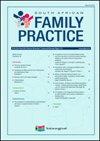Registrars’ experience with research in family medicine training programmes in South Africa
IF 1.2
Q2 MEDICINE, GENERAL & INTERNAL
引用次数: 0
Abstract
Background: Completion of a research assignment is a requirement for specialist training in South Africa. Difficulty with completion delays graduation and the supply of family physicians. The aim of this study was to explore the experience of registrars with their research in postgraduate family medicine training programmes.Methods: An explorative descriptive qualitative study. Extreme case purposive sampling selected registrars who had and had not completed their research on time, from all nine training programmes. Saturation was achieved after 12 semi-structured interviews. The framework method was used for data analysis, assisted by ATLAS.ti software.Results: The assumption of prior learning by teachers and supervisors contributed to a sense of being overwhelmed and stressed. Teaching modules should be more standardised and focussed on the practical tasks and skills, rather than didactic theory. Lengthy provincial and ethics processes, and lack of institutional support, such as scholarly services and financial support, caused delays. The expertise of the supervisor was important, and the registrar–supervisor relationship should be constructive, collaborative and responsive. The individual research experience was dependent on choosing a feasible project and having dedicated time. The balancing of personal, professional and academic responsibilities was challenging.Conclusion: Training programmes should revise the teaching of research and improve institutional processes. Supervisors need to become more responsive, with adequate expertise. Provincial support is needed for streamlined approval and dedicated research time.Contribution: The study highlights ways in which teaching, and completion of research can be improved, to increase the supply of family physicians to the country.注册医师在南非家庭医学培训课程中的研究经验
背景:完成研究任务是南非专科培训的一项要求。难以完成研究任务会延误毕业和家庭医生的供应。本研究旨在探讨注册医师在家庭医学研究生培训课程中的研究经历:方法:探索性描述定性研究。极端个案目的性抽样从所有九个培训项目中选出了按时和未按时完成研究的注册医师。在进行了 12 次半结构式访谈后,研究达到饱和。在 ATLAS.ti 软件的辅助下,采用框架法进行数据分析:结果:教师和督导人员对先前学习的假设导致了一种不知所措和压力感。教学模块应更加标准化,并侧重于实际任务和技能,而不是说教式理论。冗长的省级和伦理程序,以及缺乏学术服务和财政支持等机构支持,都造成了延误。导师的专业知识非常重要,注册人员与导师之间的关系应该是建设性的、合作性的和积极响应的。个人的研究经历取决于选择一个可行的项目和是否有专门的时间。平衡个人、专业和学术责任具有挑战性:培训计划应修订研究教学并改进机构流程。导师需要更加积极响应,并具备足够的专业知识。需要省级支持,以简化审批程序并提供专门的研究时间:本研究强调了改进教学和完成研究的方法,以增加全国家庭医生的供应量。
本文章由计算机程序翻译,如有差异,请以英文原文为准。
求助全文
约1分钟内获得全文
求助全文
来源期刊

South African Family Practice
MEDICINE, GENERAL & INTERNAL-
CiteScore
1.50
自引率
20.00%
发文量
79
审稿时长
25 weeks
期刊介绍:
South African Family Practice (SAFP) is a peer-reviewed scientific journal, which strives to provide primary care physicians and researchers with a broad range of scholarly work in the disciplines of Family Medicine, Primary Health Care, Rural Medicine, District Health and other related fields. SAFP publishes original research, clinical reviews, and pertinent commentary that advance the knowledge base of these disciplines. The content of SAFP is designed to reflect and support further development of the broad basis of these disciplines through original research and critical review of evidence in important clinical areas; as well as to provide practitioners with continuing professional development material.
 求助内容:
求助内容: 应助结果提醒方式:
应助结果提醒方式:


